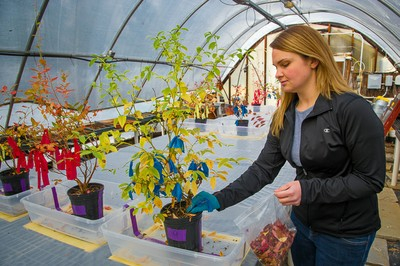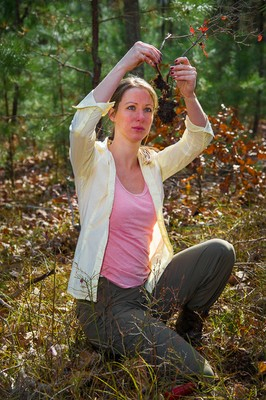CAMDEN — Not far from the Rutgers–Camden campus, New Jersey’s Pinelands National Reserve is home to some 850 species of plants within 1.1 million acres of dense forests of pine and oak, bogs, and marshes.
It serves as the perfect setting for student research; an outdoor classroom with seemingly endless natural resources.
“There’s no better place to do outdoor fieldwork for our research,” says Katie Malcolm, a Rutgers–Camden graduate student pursuing a master’s degree in biology.

Malcolm is one of many Rutgers University students utilizing the Pine Barrens to get an up-close look at plant species in their natural habitat. On a 50 acre tract off of Route 70 in New Lisbon, Burlington County, the Rutgers University Pinelands Field Station serves as home base for the Rutgers students who do research there.
Established in 1985, the field station, which is part of the Brendan T. Byrne State Forest, includes on-site lab space and is a center where long- and short-term research activities can be conducted.
“As ecologists, this is where they work. This is their classroom,” says John Dighton, a Rutgers–Camden professor of biology and Rutgers Pinelands Field Station director.
“The Pine Barrens is important for a couple of reasons. First, it’s a protected area. But also, it’s a simple system that serves a great resource for undergraduate and graduate student research,” Dighton says.
The field station’s diversity of habitats, plants, and animals lend itself to a multidisciplinary and multifunctional site for students at Rutgers–Camden and Rutgers–New Brunswick.
“The station gives students an opportunity to take the things they learn in lectures and scale it up to see how it plays out in the environment,” says Dennis Gray, a lab manager at the field station who received his bachelor’s and master’s degrees in biology at Rutgers–Camden his doctoral degree in biology at Rutgers–New Brunswick.

“We do experimental-based projects so they are able to see something from the beginning stages through the final results,” Gray says.
Malcolm, a Haddon Heights resident who earned her bachelor’s degree in biology from Rutgers–Camden, says she spends about four days a week at the field station for her graduate research. She is studying how mercury affects the fungal communities that are on leaves in the Pinelands. Even though the Pine Barrens is a pristine area, mercury can breach the environment through rainfall.
“When the trees drop their leaves, any mercury that was taken in by the leaf can be cycled into the soil through decomposition,” she says. “Many studies have demonstrated the role bacteria plays in the mercury cycle, but less is known about the role the leaf fungi play. I am interested in how fungi are affected by mercury.”
“Being out here has given me an opportunity to have a hands-on experience with the environment,” Malcolm says. “There’s no better place to do outdoor fieldwork for our research.”
Rebecca Bacheler, a Rutgers–Camden graduate student pursuing her master’s degree in biology, is looking at fungi that penetrate plant roots to help their host plants obtain more water and nutrients they otherwise cannot access.
Bacheler’s goal is to better understand the biology, ecology, and distribution of these fungi so agriculturalists could add these fungi to their soil to benefit their plants.
“Rather than just working in a lab and getting samples that are delivered from somewhere else, I can extract my own samples right here and analyze them on site in our lab,” says Bacheler, a Cherry Hill resident.
This year, students studying at the Rutgers Pinelands Field Station have had research papers published in a number of journals, including Trends in Biomaterials and Artificial Organs, and over the past three years, undergraduate students have expanded their research at the field station and studied abroad in Finland, under a National Science Foundation Grant, where they examined the sustainability of forests.
The field station also acts as a center for ecological education in the wider context, developing courses for school teachers as part of thePinelands Preservation Alliance Life Science Field Training Institute, for which Rutgers graduate credits may be earned.
Groups from other universities utilize the field station, too, for field trips and research.
“The field station is a university-wide facility, so the students get a lot of exposure to a wide variety of research opportunities right here in the Pinelands,” Dighton says.